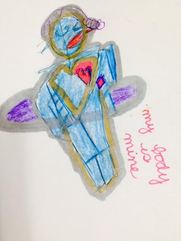
January is the busiest year of the month for me. This is why I haven't blogged more. Generally, the plan is to blog on Fridays! Friday!
I am having a study day: [dis]ability + theology. It turns out that old forms of theology bear explicit rejection.
Our forms of theology and preaching tend to reinforce ableism in a few specific ways. These are from Nancy Eisland's The Disabled God.
Friends, siblings in faith, ministers, I am going to skip to the end. Who you know yourself to be and your ability to live justly is implicated when the way you perform faith does not take these three issues into account.
I am not oppressed by my body. I am, at times, oppressed by the decision people in community make to discount the importance of my body as a container and home. I am, at other times, oppressed by the acting out of people's values: that my body is too much trouble to include in community, that they are too uncomfortable with my differing ability to envision that I can meaningfully participate with them.
I am not oppressed by my neurological differences. Rather, I am freed by them, since they are part of the mind that constitutes exactly who I am. I am not oppressed by having cerebral palsy. It is interesting, and funny, and allows me to grow into my best self by offering me over and over the opportunities to embrace my own non-typical humanity. I will never be normal. In this, there is beauty, freedom, and liberation.
I am not oppressed by arriving at my own humanity, one of the many infinite ways of being human. I am oppressed when, somehow, using a scooter makes it difficult for others to access and connect with my humanity. You may not come after me and make meaning of my body or of my disability. Stop trying to do that. My body is mine. The meaning of my body is mine. Make meaning of your own body. Free your own self.
I am having a study day: [dis]ability + theology. It turns out that old forms of theology bear explicit rejection.
Our forms of theology and preaching tend to reinforce ableism in a few specific ways. These are from Nancy Eisland's The Disabled God.
- Reinforcing negative stereotypes about disability.
- Reinforcing social and environmental segregation.
- Masking the lived realities of people with disabilities.
Friends, siblings in faith, ministers, I am going to skip to the end. Who you know yourself to be and your ability to live justly is implicated when the way you perform faith does not take these three issues into account.
I am not oppressed by my body. I am, at times, oppressed by the decision people in community make to discount the importance of my body as a container and home. I am, at other times, oppressed by the acting out of people's values: that my body is too much trouble to include in community, that they are too uncomfortable with my differing ability to envision that I can meaningfully participate with them.
I am not oppressed by my neurological differences. Rather, I am freed by them, since they are part of the mind that constitutes exactly who I am. I am not oppressed by having cerebral palsy. It is interesting, and funny, and allows me to grow into my best self by offering me over and over the opportunities to embrace my own non-typical humanity. I will never be normal. In this, there is beauty, freedom, and liberation.
I am not oppressed by arriving at my own humanity, one of the many infinite ways of being human. I am oppressed when, somehow, using a scooter makes it difficult for others to access and connect with my humanity. You may not come after me and make meaning of my body or of my disability. Stop trying to do that. My body is mine. The meaning of my body is mine. Make meaning of your own body. Free your own self.
 RSS Feed
RSS Feed